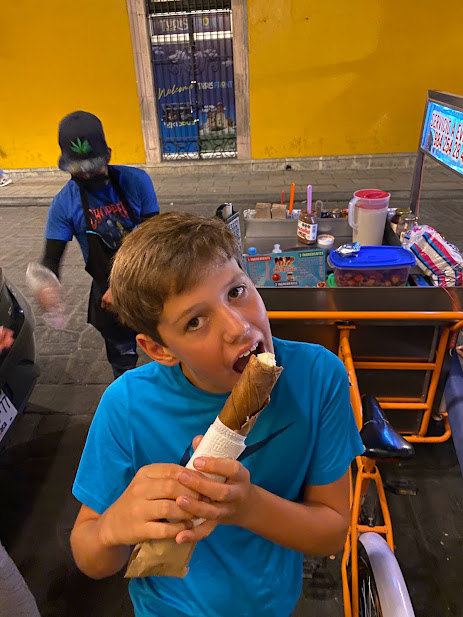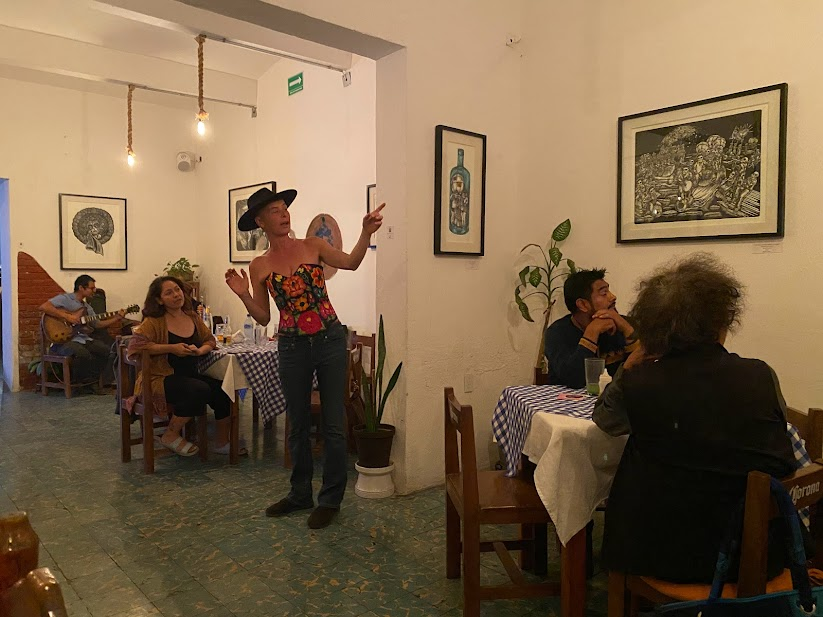4 days in Oaxaca city! March 13
- toddvandy
- Mar 14, 2023
- 3 min read
Updated: Mar 27, 2023
On February 28th we packed up our stuff and said goodbye to Costa Rica and the good friends we made there. Though we have good memories--including visits from family and friends--we were happy to move on to our next chapter in Mexico.
We'd never been to Oaxaca but have always heard great things. The town and surrounding area did not disappoint! We spent 4 nights here, including 2 full days of guided tours.
Starting with some pictures of the town itself.

Our favorite breakfast spot.

unexpected pop up art walk

Local students still in their uniforms waiting for the parade after school

..Out in front of Santo Domingo


This cathedral was started in the 1500s and is one of the most ornate in Mexico


An intriguing painting.

We understood this is where the nobility worshipped as there are more than 15 churches in the center of town, some built before this one.


Enjoying a mexican crepe from one of the many prolific street vendors.


Our first night out to dinner we chose a random place that had food we'd all enjoy, and found ourselves in the middle of an art show and live music.
The local market had everything from basket weaving to pig butchering.


Our last night there we found these pieces at an art show that summed up well what we learned and understood about Oaxacan culture and its history.


Day 1 of our guided tour.

Arbol del Tule, about 1500 years old, has the largest trunk/circumference of any tree in the world--42 meters!

A small Zaptoec town where they still weave rugs by hand using local natural materials for colors. This is still common practice around the state of Oaxaca.

It was really cool to watch them work.

The different plants and natural materials which make the colors.

Mezcal is a liquor made from Agave, which is NOT the same variety or region as Tequila.


They mash the agave hearts with a giant stone wheel pulled by a burro. Then distill the sugars from these tanks with a wood fire underneath.

This particular wild species was best

An ancient conquistador church built atop Zapotec and Mixtec sacred site. A common sight where conquering catholics/christians would purposefully construct a church on top of a local indigenous holy site.


Mitla, constructed over 1000 years ago by the Zapotec people was a campus of several buildings used for sacrifice and burial.
The original temples were covered in bright red stucco.

The construction is remarkable with geometrically cut stone (before metal tools) in an inverted pyramid shape that become stronger with the regions many earthquakes.

Our last stop of the day was heirve del agua--petrified waterfalls with springs and pools to swim in.



Coco frio and snacks wrap up a long day

Day 2 tour: Monte Alban and traditional cultural arts of Oaxaca.
Monte Alban was constructed over 2500 years ago by the Zapotecs, thrived for over 1000 years, and was eventually resettled by Mixtecs before eventual abandonment.

Inside an original tomb.

The metropolis spread over several miles of housing sites, buildings, and pyramids on top of a flattened mountian overlooking 3 valleys of their kingdom (including modern day oaxaca city)


original stucco still in tact which used to cover all of the pyramids and grounds.


Original carvings of tribal leaders in totured positions as a warning to others not to challenge the authority of this regional power.
see the small hole in the center of these steps? the entire city was built exactly in line with the cardinal positions and this one in particular included an inner chamber which illuminates when the sun is at it's highest position in the sky twice a year.

Drion examines the results of their ancient practice of brain and bone surgery.

Thousands of clay pots and sculptures


The richest treasure in all of mesoamerica was found here in the 1930s.

Crystal chalices, ancient treasure, ritualistic human sacrifices which included removing the heart. Surely Indiana Jones knew about this place.

Moving on to a school and studios where students cure, carve and paint Alebrijes. These are animals or cross-animal creations that may represent the different parts of a personality based on the Zapotec calendar. Some of the smaller pieces on the wall sold for at least $1000USD while other larger ones on the floor went for tens of thousands.

Very cool intricate paintings,

5th generation traditional black pottery sculptur, and textile weaver. When they spoke the Zapotec language, we thought it had some similarities to Native North American languages.


Day 3: Parker and Amber took a multi course meal cooking class for tamales!
The owner of this restaurant led the class

First stop: the market for all the ingredients!

mmm, crickets. We've had these a few times in Oaxaca. They're crunchy and salty.

Parker did really well. They prepared, cooked and ate at the owners house. What a special experience! Now we know how to make tamales at home




Comments